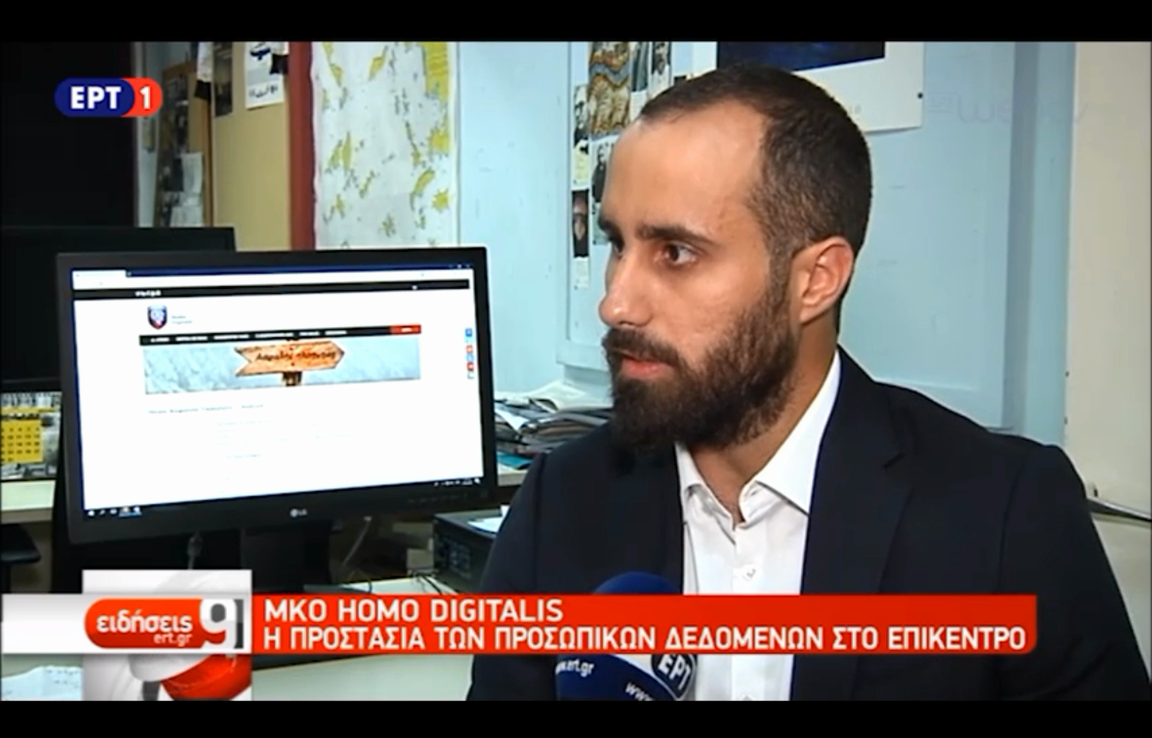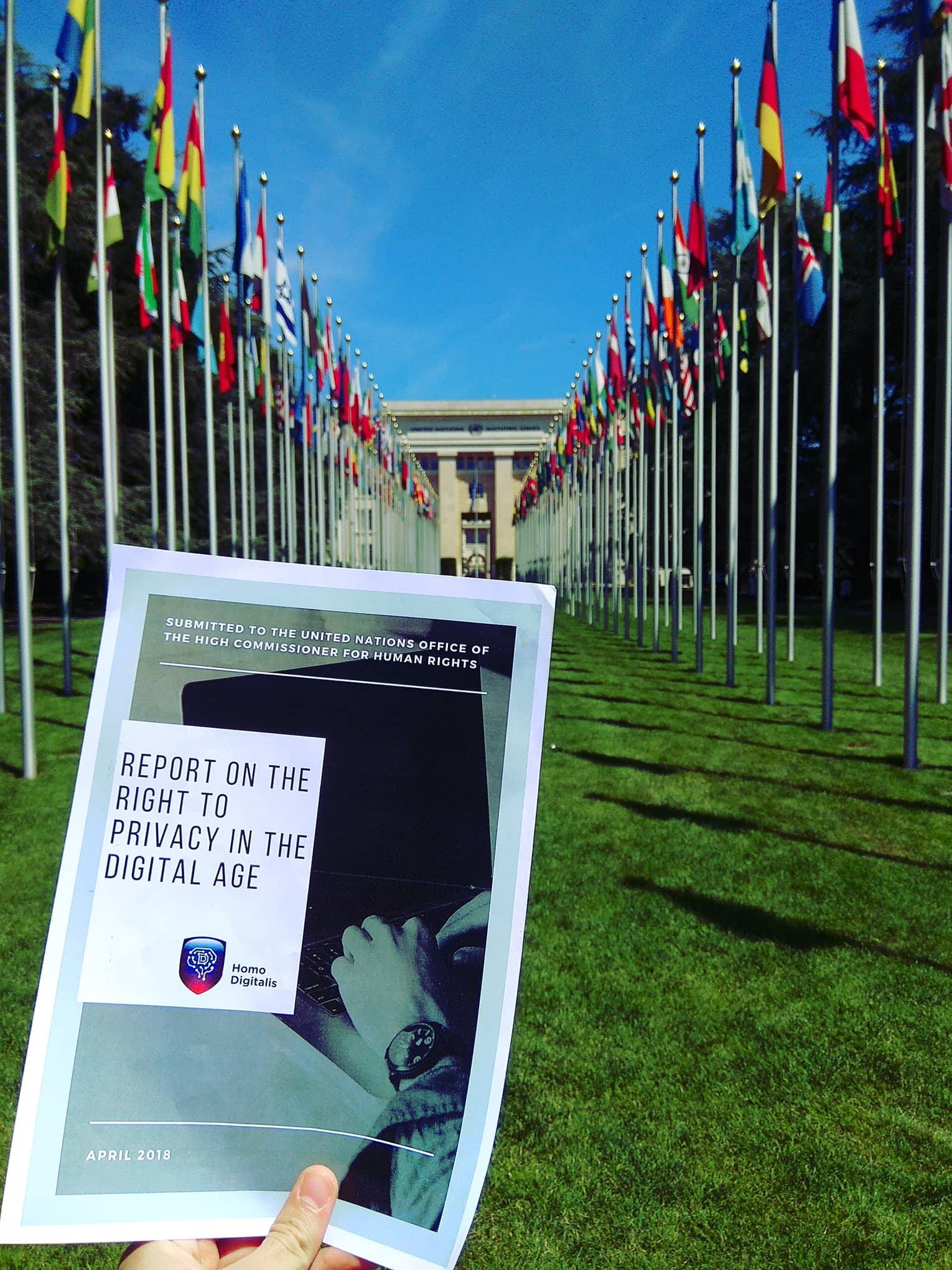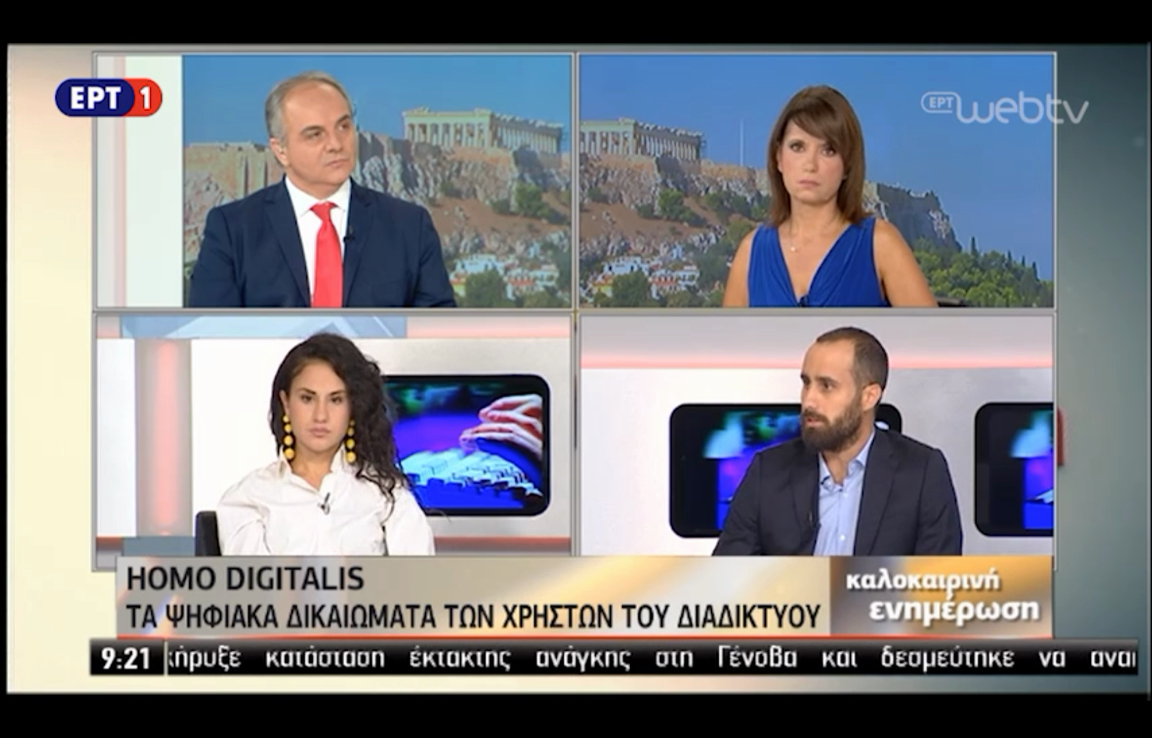Clearing up the muddle: Reformation in Intellectual Property Law
By Alexandra Giannopoulou* and Aimilia Givropoulou
Managing intellectual property on the Internet constitutes one of the most controversial legislative issues in the European Union. In recent years, it has become obvious that the creation of a digital single market requires the creation of a legislative framework, which harmonizes the rules implemented in the Member States.
The first attempt for such a harmonization took place in 2001 with the adoption of the Directive of the European Union for the harmonization of certain aspects of the right of the creator and related rights in the information society. However, this Directive failed in achieving its objective.
From 2001 onwards, technology is rapidly evolving and the lack of contemporary regulations was obvious and necessary. For this reason, with her proposal and report, which was voted in the European Parliament, the Member of the European Parliament Julia Reda, asked the legislators to revise the anachronistic rules of the Directive and proceed with the necessary reformations.
The proposal of the European Commission of 2016 does not only fail in harmonizing the legislations of the Member States, incorporating the requisite reformations, but also provides for more rules, which are threatening the structure and function of the Internet as we know it today, as well as the fundamental right to freedom of expression.
The controversial articles of the Proposal for the Directive
The controversial articles of the text in question are articles 11 and 13. The first one introduces a new exclusive right of the publishers of the Press; the second one creates the obligation of platforms, which store and give access to content, to issue licences for publishing this content by users or prohibit it from being accessible through the introduction of automated filtering algorithms, which will track copyright violations.
There is broad scientific unanimity in the criticism of the controversial articles. Article 11 suggests the introduction of a neighbouring right for the publishers of the Press and can create exclusive rights, even in short excerpts or news titles. Reusing these excerpts will thus require explicit permission by the publisher.
Despite its promising advantages, Article 11 will impede significantly the free flow of information, which is vital to a democratic society. At the same time, the catastrophic consequences of Article 13 for freedom of expression and the ambiguity in the way automated content filters apply justify the citizens’ concern regarding the requirements of the Article.
The legislative procedure and Wednesday’s vote
According to the ordinary legislative procedure in the European Union, subsequently to the proposal by the Commission, the Parliament and the Council of Europe deliberate and after the first reading can suggest amendments to the Commission’s proposal.
In the Parliament, the committee responsible is the Legal Affairs Committee (JURI), which, after having received the opinions of other committees (LIBE, IMCO, ITRE, CULT), finalized and presented its proposal last July; the proposal was rejected by the European Parliament plenary, with a majority of 318 Members of the European Parliament voting against it. As a result, JURI’s proposal could not proceed according to the ordinary procedure in the tripartite meetings between the three legislative organs.
The proposal came back on the table of negotiations of JURI and it was also opened to all Members of the European Parliament, who can submit their own suggestions for the text. The plenary will meet on Wednesday 12 September in Strasbourg to vote the final text, which will constitute the proposal with which the Parliament will join the tripartite meetings. The proposals which will be voted on Wednesday are more than 200.
Actions – How can you influence Wednesday’s vote
Since the Proposal for the Directive was published by the Commission in 2016 until today, many civil society actors, academics and pioneers in the new technologies sector have expressed their objection both to the Commission’s text and the text, which was finally rejected by the plenary in July.
Among the civil society actors is the Non-Governmental Organization European Digital Rights, which focuses on digital rights in Europe, and the European Consumer Organization, BEUC. Additionally, Internet pioneers, such as the creator of the World Wide Web Tim Berners-Lee and the co-founder of Wikipedia Jimmy Wales, as well as organs, like the Special Rapporteur for the promotion and protection of the right to freedom of expression David Kaye, have noted the negative consequences that the initial text of the Commission and the subsequent text by JURI, will have on the structure and function of the Internet.
In Greece, the non-governmental organization EELLAK, is also alert and informs regularly through its website on the latest news.
As already mentioned, the exercise of pressure from the citizens to the distinguished Members of the Parliament did not go unnoticed before July’s vote. With the upcoming elections for the Members of the European Parliament being only 8 months away, the activation of citizens is necessary and useful. Homo Digitalis sent its message to the Greek Members of the European Parliament and many citizens contacted our representatives in the Parliament.
The #SaveYourInternet movement focusing on the erasure of Article 13, offers all the required information and tools to make communication with the Members of the European Parliament easier. The outcome of Wednesday’s vote is still unclear. Participation of the people is important and necessary, since it can influence the final result and raise the legislator’s awareness.
To follow further the news you can follow our posts and the information by shadowy rapporteur Julia Reda. On Twitter, the discussions continue with the hashtags #SaveYourInternet and #FixCopyright.
* Alexandra Giannopoulou holds a PhD in Law from the University of Paris II Panthéon Assas and a lawyer. She works as a researcher in Blockchain and Society Policy Lab, in the Institute for Information Law (IViR) of the University of Amsterdam. She is an associate researcher in Humboldt Institute for Internet and Society (HIIG) in Berlin and in the Institute for Communication Sciences (CNRS-ISCC) in Paris.
* Aimilia Givropoulou is a lawyer holding an LL.M. in the Law of the Internet. She works as Legal Adviser in digital policy issues in the Greens/EFA group in the European Parliament. In the past, she has worked with the Non-Governmental Organization European Digital Rights.
Why should GDPR’s younger sister concern you as a citizen?
Processing of personal data by the police and other law enforcement authorities
By Lefteris Chelioudakis
General Regulation 2016/679 for the processing of personal data (GDPR) has monopolised interest recently. You may have already read articles by Homo Digitalis on GDPR or have read articles on newspapers, websites, etc.
But what do you know about GDPR’s younger sister, Directive 2016/680? Probably nothing.
EU Directive 2016/680 regulates a very important part of the processing of personal data, which must concern every citizen of a democratic country. The Directive concerns the processing of data by the national law enforcement authorities for the prevention, investigation, tracking or prosecution of crimes or the implementation of criminal sanctions.
Which are these authorities? Greek Police, the Hellenic Coast Guard and the Special Secretary of the Economic Crime Prosecution Authority, which is part of the Ministry of Economics, are some of them. Furthermore, Directive 2016/680 also applies on the activities of the national judiciary.
Regarding the judiciary, the acts and procedures of processing of personal data, which are included in court decisions or archives of criminal procedures, may be further elaborated by every EU Member States through its national legislation on criminal procedure (i.e. the Criminal Procedure Code in Greece).
The same national rules should regulate the implementation of the right to get informed, the right to access, the right to correction, the right to erasure and the right to limit the processing of personal data in the context of a criminal investigation and criminal procedure in the national courts.
Additionally, to safeguard the impartiality of the judiciary, the national monitoring authorities (such as the Authority for the Protection of Personal Data in Greece) do not have jurisdiction upon the processing of personal data when the courts act under their judicial power.
Furthermore, the EU Member States may provide that the national monitoring authorities do not have jurisdiction upon the processing of personal data by other judicial authorities, which act in their judicial power, such as the prosecuting authorities.
It must be noted though that the proper implementation of the Directive 2016/680 by courts and other judicial authorities should always be subject to impartial inspection, according to the EU Charter of Fundamental Rights Article 8, paragraph 3.
So, why is Directive 2016/680 important?
The first reason is that it replaces a very poor legislative framework, Decision 2008/977/ΔΕΥ, which unfortunately has a very limited scope – the transboundary exchange of data between law enforcement authorities of the EU Member States- and did not strike a fair balance between the necessities of law enforcement authorities in the context of their investigations and the rights of the persons involved in these investigations. As a result, the legal values on processing of personal data, were not respected and the rights of the data subjects were significantly weakened.
The second reason is that it constitutes the first step for the residents of the EU area to enjoy an equal level of protection when their personal data are processed by the police and the other law enforcement authorities. For the first time, a legal act regulates in a uniform fashion in the EU the way that the police officer in your neighborhood, the border guards, etc. may process your personal data. Therefore, when incorporated in the Greek legal order, the provisions of Directive 2016/680 must clearly regulate the way in which you will be able to exercise your rights before the police or the other law enforcement authorities.
It is for sure that in relation to the GDPR, your rights and the legal values regarding the processing of your personal data are significantly weaker.
However, there are provisions in which Directive 2016/680 is stricter than the GDPR. For instance, the recordings (Article 25) constitute one of these provisions. Thanks to them, when a police officer searches or shares information on you, your identity, the reason for his act and the precise date and time on which this act occurred must be recorded. Thus, these recorded files may subsequently be used to verify the legality of the processing, as well as the protection of objectivity and the safety of personal data in the context of criminal proceedings. Recordings constitute an extra obligation, which adds to the one of simple filing of the acts of processing (Directive 2016/680, Article 24 and GDPR Article 30).
Caution! Directive 2016/680 does not concern the processing of your personal data by intelligence services of the EU Member States, such as the National Intelligence Service in Greece. This happens because Directive 2016/680 is part of the EU legislation and EU law does not include issues of national security in its scope; these remain on the exclusive legislative discretion of each Member State. In this case, national law must be harmonized with the Council of Europe law and more particularly the European Convention on Human Rights kai the Convention on the protection of natural persons from automated processing of their personal data (“Convention 108”), which includes national intelligence services in its scope.
Directive 2016/680 must be transposed by all Member States in their national legal orders; this transposition is very important for the interpretation of its provision in the national level.
Although Member States should have adopted and published the necessary national legal reforms to comply with this Directive until 6 May 2018, until the day when this article was published, Greece had not adopted any law on the issue. Only Czech Republic, Ireland, Croatia, France, Italy, Austria, Luxembourg, Malta, Portugal, Germany, Lithuania, Sweden, United Kingdom and Slovakia have done so until today.
Homo Digitalis watches closely the procedure regarding the draft law for the Protection of Personal Data to comply with EU Regulation 2016/679 and incorporate EU Directive 2016/680. Thus, when the procedure is completed and the final provisions are voted, Homo Digitalis will inform you on your rights and the obligations of the law enforcement authorities.
Freedom of online expression needs you yet again!
What has happened until now?
On the 5th of July, a big win for the freedom of online expression and information was achieved.
Specifically, 318 MEPs (members of the European Parliament) voted against the proposed directive for copyrights in the Digital Market. Therefore, the directive was rejected.
At this point, we would like to remind you that the changes that the directive would cause on copyrights could considerably limit the freedom of expression and information on the Internet.
Those changes had the potential to even change the shape of the Internet as we know it.
What will happen now?
The total of 751 members of the European Parliament will now have the possibility to examine in detail the copyrights reform and submit amendments until the 5th of September.
Subsequently, the initial Proposal alongside with the new recommendations will be introduced in the European Parliament plenary on 12 September for a vote.
What can we do?
The majority of the Greek Parliament Members rejected the proposed directive at the 5th of July.
Thanks to the emails they received and the pressure by Greek voters and other Greek institutions –Homo Digitalis among them– they were informed and sensitized for the protection of the freedom of expression.
We can do the same now! By using the very simple tool that is offered here we can send mass messages to the Greek Parliament Members in order to put pressure on them to propose amendments for the proposed directive in favor of the protection of the freedom of online expression and information.
Let’s not forget that the European elections are not far off (23 and 26 May 2019). The more messages the Parliament Members receive, the more attention they will show for the retention of the Internet as we know it.
Send your message now. It will only take a minute but its impact can literally last for years!
Watch also the very interesting video of the campaign #SaveYourInternet.
Homo Digitalis on the television news of ERT1
Στο κεντρικό δελτίο ειδήσεων της ΕΡΤ1 στις 19 Αυγούστου 2018 προβλήθηκε ρεπορτάζ σε επιμέλεια της δημοσιογράφου Κατερίνας Μπατζάκη, αφιερωμένο στη Homo Digitalis και στα ψηφιακά μας δικαιώματα.
Η Ελπίδα Βαμβακά και ο Κωνσταντίνος Κακαβούλης, ιδρυτικά μέλη της Homo Digitalis, απάντησαν σε πρακτικά ερωτήματα σχετικά με τα ψηφιακά μας δικαιώματα και εξήγησαν σε ποιες περιπτώσεις μπορεί η Homo Digitalis να παρέχει νομική υποστήριξη στους πολίτες.
Are there limits to freedom of online expression?
By Konstantinos Kakavoulis
Can I express whatever I think or believe anywhere on the Internet? Are there limits in this right?
If you expect that in the end of this article you will read that the limits of online expression range from point A to point B, you will be disappointed. However, if you continue reading until the end, you will realize that there are limits to freedom of online expression and that they are clear.
“It is not an exaggeration to claim that the content of the Internet varies as much as human thought”
These words are part of the landmark decision of the US Supreme Court, Reno vs. American Civil Liberties Union. Based on this thought, the Supreme Court decided that freedom of online expression enjoys the same protection with oral or written speech.
Of course a US Supreme Court decision does not have any impact on the Greek legal order.
Nevertheless, the aforementioned quote of this decision expresses a global truth. Freedom of online expression is not a new right, born with the creation of the Internet.
Freedom of online expression is an aspect of the right to freedom of expression.
Freedom of expression is a universal, but also relevant right. It is protected under the International Covenant on Civil and Political Rights Article 19, the European Convention on Human Rights Article 10 and, as far as Greece is concerned, under Greek Constitution Article 14.
However, freedom of expression is not unlimited. Everyone has the right to express freely his opinion anywhere and at any time, as far as he/she does not violate the rights of others or the public. Therefore, freedom of online expression has limits: respecting the rights of others.
You are now probably thinking: “So, everything that is now on the Internet in the name of freedom of online expression does not violate the right of any third person?
Do racist and sexist comments, existing mainly on social media and as commentary in various sites, not infringe any right? Is bullying or the -so famous recently- fake news protected under freedom of online expression?
The answer is clear: NO
While racist comments are easily conceived by everyone, it is not equally easy to understand the fakeness of some news on the first sight. Therefore, there must be someone to decide on this, as well as on whether this news is protected under freedom of expression.
The only one who could do so with significant chances of success is the judge. However, it is not possible to expect from the judges to decide if everything that appears every day on the Internet is protected under freedom of expression.
The content production rate on the Internet is excessively bigger than the one that the highly-skilled and properly-educated judiciary can follow. Judges should definitely decide on the most important cases.
But who will check the limits of freedom of online expression on the rest of the cases?
The big Internet corporations (such as Facebook, Twitter, Microsoft, Apple, Google, etc.) have developed algorithms to track and erase content, which violates the rights of other users of rights of the public.
These algorithms have been very effective in regards to tracking and erasure of racist or sexist content, using computer vision to recognize photos which depict such content. They have also achieved in restricting bullying or hate speech.
The counterargument in such cases is that these companies establish in this way the right to freely censor content; this is a realistic risk.
What should be done in these cases is striking a fair balance between the right to privacy, freedom of expression, the right to conduct business, the right to a fair trial, as well as the necessity to combat hate speech, racist, sexist, false and any other form of bad speech.
Such a balance should be made on a case-by-case scenario and should not be done in a general fashion. It is obvious that this is far from being easy.
What we should all understand is that the Internet offers us unlimited opportunities. Under no circumstances does the right to violate the rights of other persons “because we enjoy freedom of expression” belongs to these opportunities.
In the words of Nelson Mandela:
“To live free does not mean to live without chains, but to live and behave in a way which respects and endorses the freedoms of others”.
Freedom of expression is not protected solely in the name of legality. It is mainly protected to protect the values expressed in a society.
The first and most important thing we should learn is that freedom of online is expression is not absolute. It has limits; and it is not only my freedom of online expression or yours that has limits.
There are limits to the freedom of online expression for all Internet users. This happens because without limits, it will cease to exist; not only freedom of online expression, but also the Internet as we know it. And this is something that -I at least- have not met anyone who wants it.
Homo Digitalis on the Kritis TV Main News
On August 22, 2018, Elpida Vamvaka, president and founding member of Homo Digitalis, was a guest on the main news bulletin of Kritis TV and spoke about our digital rights and the organization’s actions
Homo Digitalis on the 'ALLA NEA?' show (Athens 9.84)
Eleftherios Chelioudakis from Homo Digitalis had a very interesting discussion with Elena Bregianni on air at Athens 9.84.
The report of Homo Digitalis in the UN website
The report of the UN High Commissioner for Human Rights on the right to privacy in the digital age was published. The report will be presented in the 39th session of the UN Human Rights Council, which will take place in Geneva from 10 to 28 September 2018.
Homo Digitalis, responding to the open call of the High Commissioner, contributed in the drafting of the report by submitting its report.
In Chapter One of this report, Homo Digitalis focuses on encryption and anonymity as elements which reinforce human rights protection, including freedom of expression and freedom of opinion. In Chapter Two, Homo Digitalis evaluates the legislative framework on metadata of electronic communications in Greece. Finally, in the last Chapter of the report, Homo Digitalis puts forward its recommendations for the promotion and protection of the rights analysed in the two main Chapters.
The report of the UN High Commissioner is available here.
The report of Homo Digitalis has been published in the UN High Commissioner’s official website and is available here.
It must be noted that reports from Greece have also been submitted by the Ministry of Justice, the Home Office and the Ministry of Digital Policy, Telecommunications and Media.
Homo Digitalis on “Kalokerini Enimerosi”, ERT1
Η Homo Digitalis έδωσε την πρώτη της τηλεοπτική συνέντευξη.
Οι Ελπίδα Βαμβακά και Κωνσταντίνος Κακαβούλης, ιδρυτικά μέλη της Homo Digitalis, φιλοξενήθηκαν στην πρωινή ενημερωτική εκπομπή της ΕΡΤ1 “Καλοκαιρινή Ενημέρωση” στις 17 Αυγούστου 2018.
Σε μία πολύ ενδιαφέρουσα συζήτηση με τους παρουσιαστές της εκπομπής κ. Γιάννη Φασουλά και κα. Νίνα Κασιμάτη, μίλησαν για το ρόλο, τους σκοπούς και τις δράσεις της Homo Digitalis.
Ανέλυσαν την έννοια των ψηφιακών δικαιωμάτων και αναφέρθηκαν σε παραδείγματα προστασίας κάποιων ψηφιακών δικαιωμάτων, ενώ αναφέρθηκαν επίσης σε κάποιες από τις δραστηριότητες που προετοιμάζει η Homo Digitalis για το φθινόπωρο.








